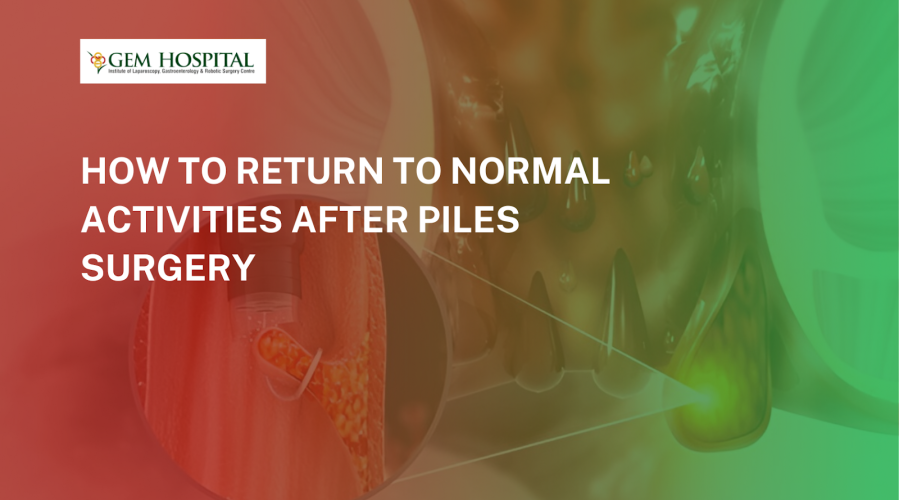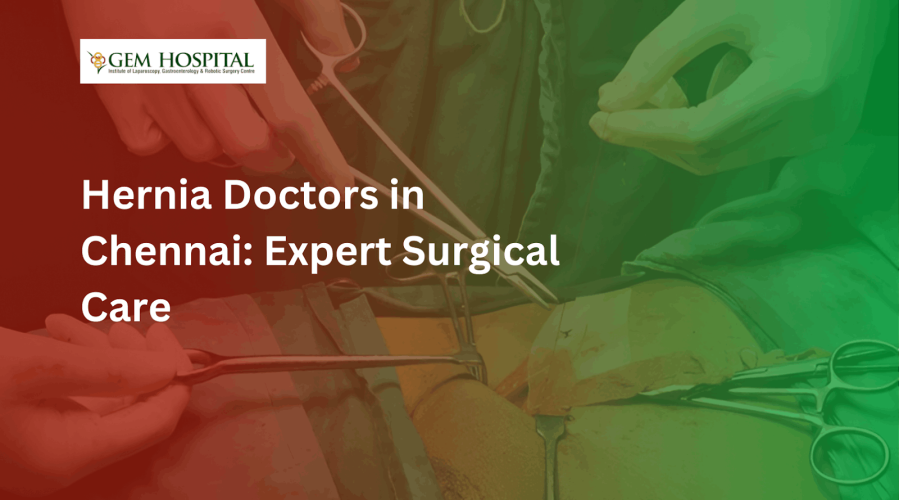Consult experienced hernia doctors in Chennai for expert surgical care. Advanced diagnosis, safe hernia surgery, and faster recovery with specialized treatment.
How to Return to Normal Activities After Piles Surgery

Piles, or hemorrhoids, are a very common condition that results in inflammation and discomfort in the veins of the lower rectum and anus. If untreated, piles can lead to significant discomfort and inconvenience. In severe cases of piles, the most effective treatment is likely surgical. After piles surgery, many patients are excited to begin returning to their everyday life. However, recovery following surgery is critical, and the proper plan of action can assist with recovery and complications. This blog will cover some important post piles surgery care tips to help you get back to your routine as quickly as you can.
Returning to Normal Activities After Piles Surgery
- Gradually Resume Physical Activity: Start with light walking and slowly increase activity levels.
- Avoid Heavy Lifting: Do not lift heavy objects for at least a few weeks to prevent strain.
- Maintain a High-Fiber Diet: Eat fruits, vegetables, and whole grains to prevent constipation.
- Stay Hydrated: Drink plenty of water to ease bowel movements.
- Practice Good Hygiene: Keep the surgical area clean and dry to prevent infection.
- Monitor Bowel Movements: Avoid straining during bowel movements; use stool softeners if recommended.
- Avoid Sitting for Long Periods: Take breaks and move around to improve circulation.
- Attend Follow-Up Appointments: Regular checkups ensure proper healing and address complications early.
Post-Surgery Immediate Care: Healing is Priority
Immediately after piles surgery, your focus must be healing. It is expected for the procedure to lead to discomfort, swelling, or even some bleeding. However, these symptoms should resolve within a few days. To relieve discomfort and promote healing, it is important to follow your physician's recommendations regarding pain management: this may include both prescribed medications and/or over-the-counter pain management. Furthermore, it is critical to keep the surgical site clean and dry in order to prevent infection. Your physician may recommend the use of a sitz bath , to help relieve pain and swelling in the anal region. Avoid any aggressive cleaning or using harsh soaps, as this will only irritate the area and slow recovery.
In the first few days post surgery, avoid sitting or standing for too long.Rest is essential after surgery, but equally important is avoiding stiffness or a sedentary state because you increase your risk of developing a blood clot. If sitting causes you discomfort, you may want to use a cushion to relieve pressure around the surgical area. Eating a diet that is high in fiber and drinking plenty of water to stay hydrated will help to avoid constipation, which can be straining to the surgical site. Mild walking and light dates will also promote circulation as you heal.
Start Gradually Resuming Normal Activities.
As your focus shifts from rest to healing, you will be able to start thinking about getting back to your activities. After having surgery for piles, the timeline for getting back to physical activities is different for everyone. For many, getting back to regular activities can happen anywhere from two weeks to four weeks after surgery. Remember that you are going to be returning to light activities first and may need at least a couple of weeks to return to regular (non-high risk) activities. No running or weightlifting (high-impact activity) at least for a month or until our doctor deems it to be safe to return to physical activities.
Pay attention to your body during this recovery period and relate to any pain. If an activity causes significant pain and/or discomfort, that is your body telling you to rest, so take that as your sign to rest. As always, it is better to be careful and take your time and gradually resume an activity than to have to pause your recovery by Light piles exercise, such as walking or gentle yoga, will be a great way to help with circulation and muscle strength without putting too much stress on your surgical site.
If you are in a job that does not allow you to break your sedentary position, take breaks if you are able. Sitting for an extended amount of time may increase pressure to the rectal area, which is not helpful to your recovery. Try to stand, stretch, or take a short walk every hour to allow blood flow. When you are ready (you won't be doing much physical work), after 2-3 days you may return to work and try limited activity for the day.
Diet and lifestyle changes are also going to be important for your recovery after piles surgery. The first priority is going to be constipation prevention. You want to be sure that you are consuming dietary fiber, since fiber can help soften the stool and decrease bowel movements. Fiber is plentiful in many of our options, but be sure to eat plenty of fruits, vegetables, legumes, and whole grains. You may consider fiber supplements, but make sure to discuss this with your doctor. Along with fiber, you will want to be sure you are consuming proper amounts of water throughout the day which will be more effective to aid in smooth digestion.
You will want to avoid any spicy foods, alcohol, and caffeine. Spicy foods, alcohol, and caffeine can aggravate your digestive system, which may be another source of pain after the surgery.
Your healthcare provider may also suggest stool softeners or mild laxatives if you are experiencing trouble with bowel movements. It is always best to follow your practitioner's advice and dosage recommendations.
Another aspect of care post-piles surgery involves maintaining proper hygiene. After each bowel movement, it is best to continue using a gentle wipe or wet cloth to clean the area (rather than dry toilet paper), as this can soothe rather than irritate the area, and keep it cleaner. Your healthcare provider may also suggest special wet wipes or topical ointment to help soothe the area and promote healing at the surgical site.
When to Contact Your Provider
Overall, recovery from surgical treatment of piles is quite smooth, but if you notice the following you should contact your healthcare provider: severe pain, excessive bleeding, or you are experiencing signs of infection (i.e. redness, swelling, fever). These could indicate complications, which require treatment in order to be resolved. You should also seek guidance from your doctor if your bowel habits or constipating fails to improve despite dietary changes and taking medications.
Ensuring Your Recovery is Smooth With Gem Hospital
Returning after piles surgery to normal activities is possible by following appropriate care and precautions. If you follow the post-surgical instructions your healthcare provider has given you, balance the management of pain, and make your necessary lifestyle adjustments, then you can have a speedy recovery and get back into your life without extra discomfort. Always listen to your body and take baby steps back into your normal activities, especially for the first few weeks after your surgical procedure.
If you have piles and are seeking expert care, Gem Hospital can help you with a variety of treatment options including surgery for piles and proper post treatment care. Our medical professionals can help you recover with the understanding of exactly where you are in the recovery process. For a complete and seamless recovery, we invite you to schedule an appointment with us at Gem Hospital today for a proper consultation and personalized treatment plan.
Blogs & Article
Get advanced liver transplant treatment in Chennai with expert surgeons, modern technology, and comprehensive care for safe and successful outcomes.
Get advanced piles treatment in Erode with expert doctors. Safe procedures, modern technology, and effective care for fast relief and recovery.


